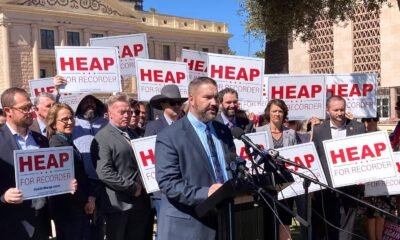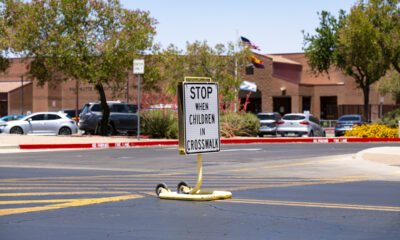arizona
Maricopa County Recorder Pushes for Ballots to Rural Voters Who Never Requested Them

This article was originally published by Votebeat, a nonprofit news organization covering local election administration and voting access.
Maricopa County Recorder Justin Heap’s recent proposal to mail ballots for the upcoming July election to voters who haven’t requested them has stirred significant controversy. This unexpected suggestion particularly alarmed his fellow Republicans, including county supervisors, who quickly moved to block it. GOP Chairwoman Gina Swoboda expressed in a letter that Heap’s plan raised legal concerns.
Heap argues that the initiative aims to prevent disenfranchisement among rural voters facing extreme travel distances to polling places. His stance is rooted in a larger context of election integrity, which he championed during his campaign.
The special primary election on July 15 is crucial for replacing U.S. Rep. Raúl Grijalva, who passed away in March. Heap indicated during a May 5 meeting that he intended to send ballots to a select group of rural voters who did not opt for early voting. In Maricopa County, about 60,000 voters reside in the district, primarily in areas like Avondale and Gila Bend. While most have convenient access to polling places, a subset of rural voters faces lengthy travel durations—sometimes up to 30 miles.
According to Sam Stone, Heap’s chief of staff, these rural voters encounter “significant drive times” during elections. To mitigate this issue, Heap proposed mailing ballots to 34 voters in the Bullard and Mobile precincts.
Historical precedents exist for such actions. Helen Purcell, a former Maricopa County recorder, confirmed that she occasionally sent unsolicited ballots to rural voters when needed. However, recent legislation has tightened rules around ballot distribution, making Heap’s current proposal legally contentious.
In 2021, a law was enacted that specifically prohibits election officials from mailing ballots unless requested by voters, following disputes over similar proposals. After Heap’s announcement, the county supervisors swiftly questioned the proposal’s legality, ultimately voting to exclude it from their approved election plan.
County Attorney Rachel Mitchell later reaffirmed the illegality of Heap’s suggestion, intensifying the debate within the Republican ranks. In response, Heap issued a statement on social media, asserting that his plan was crucial to ensure rural voters could access their ballots. He accused the board of exploiting the situation for political gain.
The lone Democrat on the board, Steve Gallardo, voiced support for expanding voting options, emphasizing the need to address the needs of rural voters in future elections. “This is not going to be the last time we come across that situation,” he noted, highlighting the ongoing challenges in facilitating equitable voting access.


















